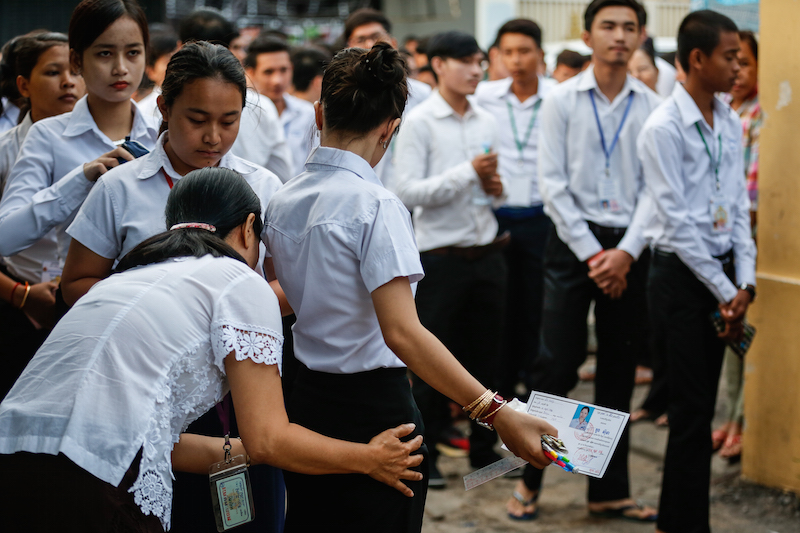The more than 100,000 students filing into high schools across the country this morning to sit for the national high school completion exam typically have a different attitude toward their studies than those who took the exam four years ago, according to experts across the board.
They study.

In 2013 and before, the event—the deciding factor for who is qualified to enter university—was chaotic. Copies of the exam answers were sold outside the gates of high schools. Parents could be seen throwing cheat-sheets through classroom windows to their children. Proctors would turn a blind eye as students copied answers onto their exam papers in exchange for bribes. Cheating was simply a part of the process.
The following year, newly -installed Education Minister Hang Chuon Naron pursued his promises of educational reform, leading an effort to crack down on the rampant cheating. The exam has since become the highlight of Mr. Chuon Naron’s tenure.
“The grade 12 exam alone really encouraged students to learn from their classes,” said Chin Chanveasna, executive director of the NGO Education Partnership. Previously, he said, there was no need for students to engage in coursework because they could pass with a few payments to proctors and guards on exam day.
“They don’t expect that they can cheat anymore, so I think that has an impact, as you can see, on the whole system,” Mr. Chanveasna said.
On exam days, gatekeepers now pat down students as they arrive, confiscating cheat-sheets, calculators and smartphones. Thousands of volunteers working for the country’s Anti-Corruption Unit stand outside classrooms monitoring the students and their proctors. And threats of legal repercussions loom above anyone contemplating testing the new system.
The reforms initially caused the pass rate to plunge from about 80 percent to 26 percent in 2014. A retake opportunity that October brought the rate up to about 41 percent—and each year since it has crawled slightly higher.
As those numbers rise, so has the engagement and quality of students, said Song Soksan, head of the ministry’s higher education admissions department. Now, there are more critical thinkers entering universities, he said.
“They changed their culture and attitude in studying. They make study clubs in the high schools and universities,” he said.
“The students from high school have enough quality now because they have the ability to get the real score to pass the exam,” he said. “It’s had a good effect on higher education.”
A greater share of the 101,410 students registered for today’s exam are expected to pass, Mr. Chanveasna said, up from last year’s 62 percent. The number of Grade-A students is also expected to surpass last year’s 405.
However, Luise Ahrens, manager of the Maryknoll education program at the Royal University of Phnom Penh, said the exams themselves needed to be reformed beyond the crackdown on cheating.
What is lacking “is a reform of the examination question banks and the exam contents,” she said in an email.
“Some questions are unanswerable, some are direct quotes from high school textbooks, requiring memory and not thinking; none of the lab-based materials are included, essays are very hard to correct with objectivity, etc,” she said.
In regard to reforms up to this point, however, the “results have been quite good,” she said.



